
If you start making a difference, more people will follow.
If you start making a difference, more people will follow.
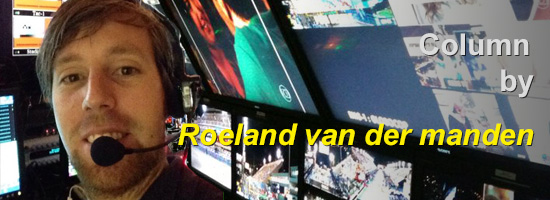
As this is the first column of 2018 i would like to start to wish each and every one you a great new year full of chances and new opportunities, to chase your dreams and step out of the ordinary and fulfill your wishes in business.

That said; let’s take a look at the new year. This year is election year, which means a lot, depending on the outcome, more than ever before. The country is on its knees but there are positive signs for the next year. At the end of last year people already spend more money on gifts, more people got jobs so there is light at the end of the tunnel. But the outcome of the elections will decide if that light keeps growing or if it will diminish. I like to see the glass half full rather than half empty, seek opportunities and go for it. Election year in general also means more jobs in the media industry as all the politicians needs there commercials, promo videos and so on, that’s another positive point.
At the moment I am abroad and I always get surprised about the development elsewhere and the fact that Brazil needs these changes too.
Today I want to use as example the equipment from EVS Broadcast Equipment. This company develops soft- and hardware for the broadcast industry. They started back in 1994 with equipment for replays. Nowadays it is the most used system in the world for replays, live editing and recording and they develop new soft- and hardware all the time.
Last week I was part of the broadcast team for Camels 2018 in Saudi Arabia. This is one crazy event about camel races, camel fairs and everything that involves camels in the middle of the desert near Riyadh.
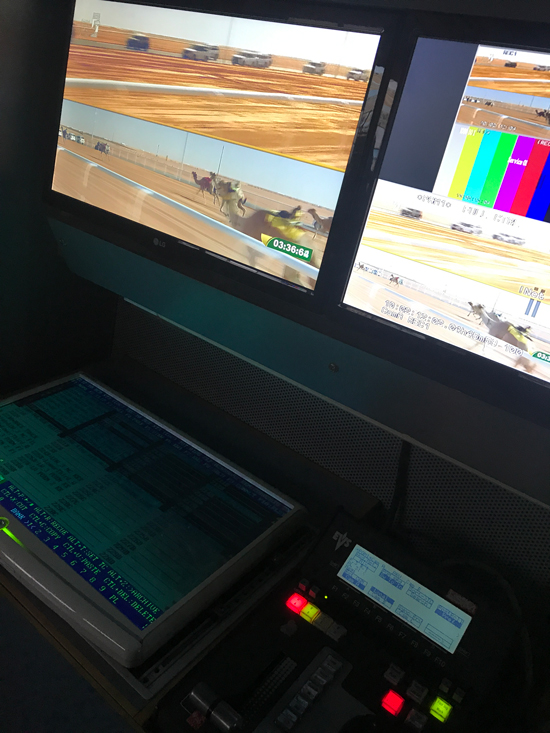
There I used for recording a so-called Xfile system. It’s a system that allows you to record feeds and restore clips form the EVS server to Hard disks for example.
This system also allows you to streams directly to HD’s. You can stream up to six feeds at the same time to several destinations. Copying this would take a lot more time, so it is very handy and time saving. And time is money, so a very good solution.
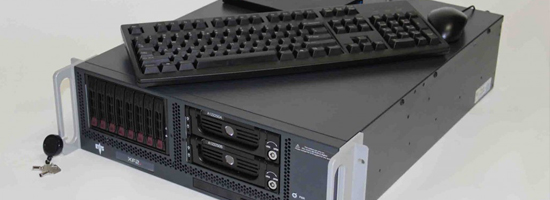
In Brazil I have never seen this system being used while it exists in the OB vans. Operators don’t know how to use it so they stay behind from the rest of the world.
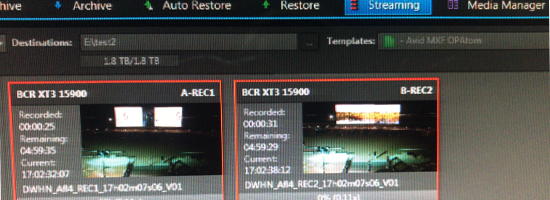
Operators who are using this system are being invited to work all over the world and they gain a lot of experience and can improve the workflow and quality of TV making. That is a missed opportunity. It requires little effort and it’s really worth it.
Opportunity !!
Last year we even searched for english speaking EVS operators in Brazil for a client, there was non to be found!!
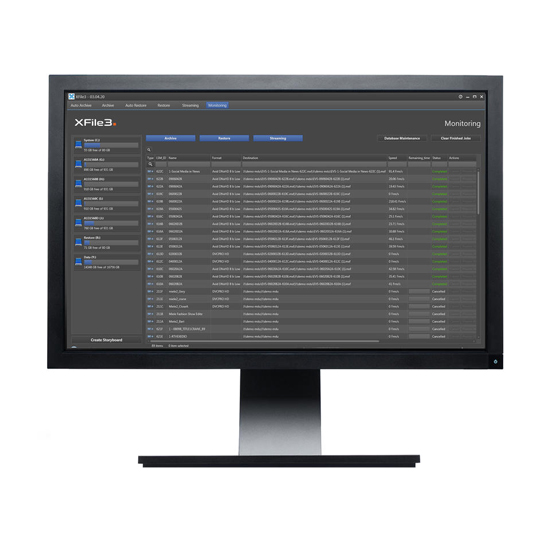
This is just an example but there could be many more projects like these and it all starts at the attitude. No one gets anything done by saying that won’t happen. We just have to make it happen and it all starts at your very self.
If you start making a difference, more people will follow.
So let’s start the year positive by thinking about opportunities and making market for all of us! To an excellent new year from all of us at Broadcast Brazil!
video:
Links:
EVS Broadcast Equipment
Roeland van der Manden
More info you can find on his LinkedIn: www.linkedin.com/pub/roeland-van-der-manden , Check his website or follow him on Twitter AmsterdamProductions
Pay-tv, But what are we paying for?
Pay-TV, Pay-tv, But what are we paying for?

This time I want to talk about the rights on pay-tv. In Brazil there are many pay-tv channels not to talk about the sports and movie channels. All those channels people have to pay for to watch as the name describes.
But what are we paying for?
Let's pick GNT for example. This is one of the biggest pay channels in the country and yet they show so little. People pay for reprises. Some programs have 2 seasons a year and they are being repeated over and over throughout the year. And that's the case for almost all channels. If you see the programming for a week the same episode passes sometimes 3 to 4 times.

It's a vicious circle. Because of this people will more and more move to platforms as Netflix where they can watch tons of new content every day and these pay channels will lose more viewers and make less money. That’s a real threat. So pay channels need to invest more in new content, especially now it’s crisis in Brazil and people will spend more time watching tv at home instead of going out.

That brings me to another part of pay-tv. In Brazil among a growing amount of other countries people have to pay to watch live sports. We have nowadays FOX sports, ESPN, Esporte Interativo and SporTV in Brazil. Besides those channels there is as well Premiere. Premiere is a pay per view channel where you can watch only some soccer matches. These are matches from the same championship as the matches that pass on SporTV and FOX sports for example.

For example, a viewer from Rio de Janeiro can’t watch in many occasions the match of their favorite team from Rio. Those matches are blocked for the state of Rio but in the rest of the country you can watch those matches on SporTV. So the matches are only blocked in the state of the home team or the state where the match is being played. The viewers who want to see the match of their favorite teams are obliged to buy the game at the pay per view channel even if they bought a package of sports channels at their provider. That is for me the biggest example of screwing your viewers. You can see all soccer matches except for the ones that you really would like to see. Imagine a Chelsea fan who pays monthly to watch the matches in the premiere league but he can watch all matches except the ones from Chelsea. To watch a match of Chelsea he needs to buy a pay per view.

At this moment, especially, pay channels need to think what is important to them; happy customers or a lot of money. Because if they continue like this the money option is ending and that will result in less and less customers, read viewers, to whom they can sell their content and commercials.
Because…….
Brazilians are crazy about sports, but they are not crazy!!
Links:
Telecom and Pay-TV Services Markets in Brazil Set to Grow at 2.3% CAGR During 2017-2022
Number of subscribers of select pay TV providers in Brazil from April 2016 to April 2017 (in thousands)
Roeland van der Manden
More info you can find on his LinkedIn: www.linkedin.com/pub/roeland-van-der-manden , Check his website or follow him on Twitter AmsterdamProductions
mentioned:
GNT
Netflix
FOX sports
ESPN
Esporte Interativo
SporTV
The jogging dead
The jogging dead

The end of the summer break is near. People are coming back from holidays, schools are opening its doors again and the new TV season starts! That's for me the best part of the end of the summer, beside the so desired temperature drop.
Last week already some programs started the new season but the big majority starts after carnaval. Saia justa, papo de segunda among others will open the new season in the second week of march. As you can see, GNT is a favourite at home. Pedro pelo mundo is one of our favourite programs. I like the way the program is structured and the places they visit. But sometimes I wonder if this is Pedro at his most exciting, probably it's just the way he is. But he could be a little less monotonous and put some more emotion in his show.
I hope we will see some new programs this year, not just a new show but something never seen before on Brazil's pay TV.
I hope it's just the summer break but maybe the crisis is behind the countless repeats on GNT for example. Some shows pass over five times a week. And not only during the day but also at night and even at prime time.
I was by far the most bizarre thing I have ever seen on TV
And than there was off course the second part of the seventh season of The Walking Dead. Many people were looking forward to the restart of the serie. But it was what happened before the new episode that caught my attention. And not only mine but of many others as well as I saw later on facebook. Fox was showing all the previous episodes of the series in a marathon. The episodes were speeded up by thirty! percent. Why? According to FOX there wouldn't be enough time to show all the episodes in real time. What? Not enough time? How do you mean, isn't that just a case of starting earlier? I couldn't even understand the serie because they spoke too fast. It was by far the most bizarre thing I have ever seen on TV. The person who came up with this idea should be very ashamed!
It was almost like watching an old movie from the 30's when, because of the tapes they used, everything appears faster than it is in real life. I was waiting for Charlie Chaplin, as a zombie maybe? Lucky enough, in the time of Chaplin there only were silent movies.
Source: GNT , Diario de Pernambuco , FOX Brasil
Roeland van der Manden
More info you can find on his LinkedIn: www.linkedin.com/pub/roeland-van-der-manden , Check his website or follow him on Twitter AmsterdamProductions
Startup a company in Brazil
Startup a company in Brazil

Who has done it before knows that it can be a real challenge. Starting up a company in Brazil as a foreigner. A lot of bureaucracy waits for you when starting a company. In this column I’ll go over the types of companies that exist, and how much you can invoice with each of them.
Microempreendedor Individual
The easiest for Brazilians who just need a company so they can emit invoices is a microempresa. They can just register a MEI (Micro Emprendedor Induvidual). You will only need your electoral title and personal contact details. Then you will get your CNPJ and you can emit invoices. This will only take you an hour or not even that much. The problem might be that you can only invoice up to R$ 60.000 per year, about R$ 5.000 per month. And there are a couple of other things you have to pay attention to. For example, it’s not aloud to open a MEI in your name if you are involved as a partner in another business or if you already have another company.
Micro empresa and Empresa de Pequeno Porte
Who has bigger plans with a company, or is a foreigner, needs another type of company, the “simples” (LTDA) for example. With this system you can invoice up to R$ 360.000 yearly and in the case of Empresa de Pequeno Porte even up to R$ 3.600.000 on a yearly base.
A good thing about the last system I mentioned is the tax percentage. This all depends on your turnover. At the beginning you would pay 6%, but when your company starts to run well, your tax percentage will raise as well. A fair system with good tax rates in my opinion. When comparing this to the Netherlands the rates a quite a bit lower here in Brazil. Though, to start this kind of company you need to bring in a lot of documents and be patient.
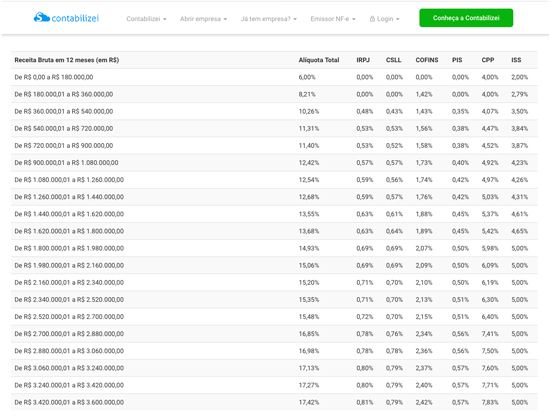
Talk to an accountant to see what kind of company suits your business or ideas; this can avoid a lot of trouble and surprises afterwards.
When you talk to an accountant about opening your company, mention right from the start in what area you want to start your business. This can be of importance later on when invoicing for your services or product.

Don’t give up!
It is not cheap to startup your own company here, I think I paid around R$ 3.500,00 to R$ 4.000,00 on taxes, fees and the accountant off course.
Once you got that done, what took me about a year, you have to think about a company bank account. That went pretty smooth, I think it took me a about two weeks to get it all done. The only problem I had with some foreign clients was that I couldn’t receive money from abroad until 3 months after opening the bank account. Keep that in mind in your planning.
Good luck business(wo)men!
Source: www.brasil.gov.br
Video
Roeland van der Manden
More info you can find on his LinkedIn: www.linkedin.com/pub/roeland-van-der-manden , Check his website or follow him on Twitter AmsterdamProductions
ATP Rio open 2016
ATP Rio open 2016
Like bread without butter
This year was the third year of the ATP 500 Rio open at Jockey Club Brasileiro in Rio de Janeiro. The biggest tennis-tournament in South America and the 18th biggest tournament around the world.
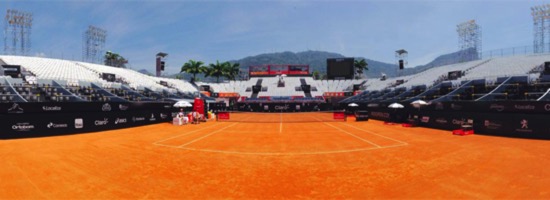
As in previous years, Globosat again did the world feed and it was my third time at the transmission as well. I saw it starting of with twelve cameras, the year after there were twelve cameras as well but two of them were high-speed cameras for the superslomos. At this years edition there were again twelve cameras and three high-speed cameras. This is a pretty rich coverage for an ATP 500 tournament. Around the world this setup is used for a masters 1000 tournament, which is way bigger than an ATP 500. I was one of the three EVS-operators at this event and was responsible for the superslomos, winners package after each set and some highlight edits.
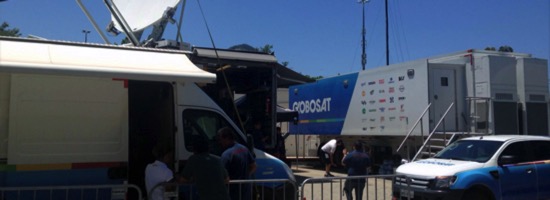
World feed
Globosat owns a lot of channels. SporTV is among those channels and was the channel we worked for in Brazil. When working on the world feed you have to keep in mind that you are not only working for the local channel but also for the rest of the world. The ATP did the countdowns for the world feed, this means that they tell you when you go to the commercial break and when you are back on air. This is all scheduled and is a fixed pattern during the whole tournament.
This way all TV channels around the world know exactly when they can go the commercial break and when they have to back before the match continuous.
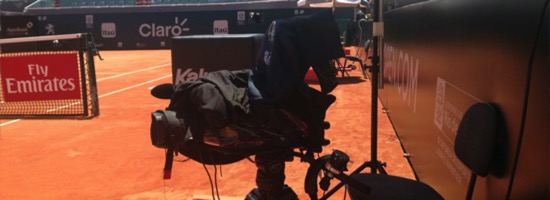
This year we had a new director without any experience in tennis, and without experience working on a world feed. I noticed that he made some mistakes regarding this, taking the SporTV countdown as leading. Normally he works that way so the first day, you can imagine, he needed to get used to that. But all week long he forgot that he was working for ATP instead of SporTV. Sometimes this lead to some mistakes. For example, ATP requires a wide shot coming back from break to air some graphics about the game score, when SporTV got shorter commercial breaks he had already cut to a close shot. It weren’t big mistakes, and maybe people at home haven’t even noticed it as a mistake. But in these details you can see that Brazilian networks aren’t used to transmit the world feed. With more and more international events coming up in Brazil in preparation to this year’s Olympic games this is an important lesson to be learned.
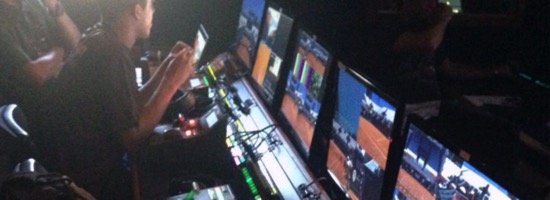
Risk taking
When I worked in the Netherlands 4,5 years ago I heard some directors there saying that Dutch broadcasting is leading and following. They mean to say by that, that they copy things from other countries, things they like, and that they try new things every now and then.
For example, last year there was a brilliant shot during the Dutch classic of soccer between Ajax and Feyenoord in Rotterdam. The director sent the camera inside the players tunnel and when the hatch opened he followed the goalkeeper, who just transferred to “the enemy”, for more than two minutes continuous. It was a shot like in a computer game and it went all over the world.
Feyenoord - Ajax opening by Ben de Graaf for Fox Sports NL:
This example is something you will never see in Brazil. There exists a pattern and everyone without exception follows that pattern. Back to the tennis tournament, when you have a coverage similar to a masters 1000 there must be something extra you can show despite the superslomos only. I am sure I wouldn’t have noticed this exceptional coverage for a 500 tournament watching at home.
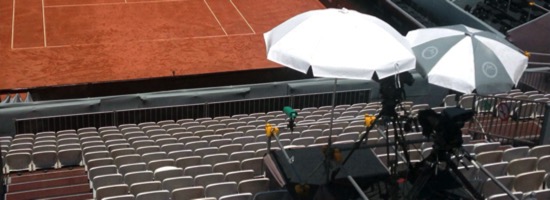
The director didn’t take any risk for the million dollar shot. When you have twelve cameras, you can afford to miss one camera to get that shot people will talk about. Like I said, the director was inexperienced with tennis so I wouldn’t consider this his fault or lack of creativity. But this is something production crews should think about. Let’s not forget the tournament was broadcasted in over a 100 countries around the world. That’s a great stage to show your skills internationally.
Result
The transmission was pretty nice and ATP was a happy client. In this case my point isn’t about mistakes but about missed chances. I have to say there were very little mistakes for the amount of hours we broadcasted. So, congrats to the direct, producer, camera guys and the whole production crew. And, in my previous columns I sometimes wrote about the poor quality of care and catering but this time everything was lovely arranged!
#BehindTheScenes Video
Photo Album ATP Rio Open 2016
Roeland van der Manden
More info you can find on his LinkedIn: www.linkedin.com/pub/roeland-van-der-manden , Check his website or follow him on Twitter AmsterdamProductions
mentioned:
SporTV GloboSAT: website
Globo TV: website
EVS: website - facebook - twitter
Salary in Brazil
Salary in Brazil
Brazil must start to reconize the new occupations in AudioVisuals.
This time I would like to talk to you about the salaries in Brazil. Most people know salaries here are much lower than in countries such as the U.S. and Western-European countries. I have no information about other countries so I just keep it in this column by these countries. But, please feel free to leave a reaction to share info with us.
When I worked in the Netherlands in the TV area I started my career in EVS with a day rate of 90 euros a day. Mostly I worked at soccer matches and I used to arrive around three hours before the kick-off. Once we arrived, we divided work, who would be on which machine, who would make the roll out, who would make highlights etc. Then we went for lunch, about one-and-halve hour before the match we would go to the truck preparing ourselves. Then we worked on the match, and once the match was over we recorded interviews, press conference and we played out all valuable content to the network and our day was over. I think a total of six hours at the location. Like I said, in my first months my day rate was 90 euros, after it went in two years up to 275 euros per day.

Brazil is a whole different story; the country is way bigger than the Netherlands off course. When we do a production here in the city of Rio, the Maracanã stadium for example, we arrive as well around three hours before kick-off. We divide work once everybody arrived, and than it’s waiting until kick-off. We don’t get to lunch all together at the venue, or somewhere else. Brazilian productions are way cheaper in all ways. The production companies are not used, or allowed, to spend money on their crew. This only in sports by the way. When I work on a concert registration, there is lunch or dinner available. When I work on the carnival feed, the company takes really well care of the crew.
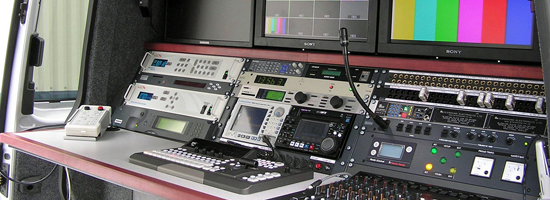
Now, in all these productions, except for Carnival, the day rate is around 250 reais ($ 65,00!!/€ 58,00!!). And this is a day rate without a maximum of hours. There should be a maximum of hours but almost never respected by the employers. This is for a production in the city of Rio.
For a production in the state of Rio, or even outside the state, day rate are a little higher, 300 reais ($ 77,00/ € 70,00). On these days you go with all crew together to the venue by shuttle bus. It is not unusual to travel over 5 hours to get to the venue, than you stay there for 5/6 hours and then you go back on the same day. This mean your work day is over 15 hours and you get paid a normal day rate, no extra money you spend travelling for your work. Mostly you receive 30-50 reais for food and drink along the way.
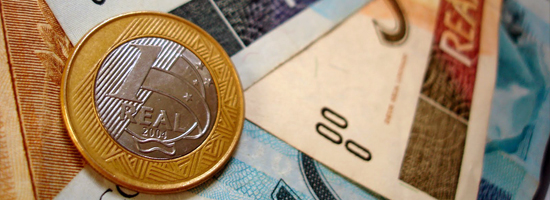
The number above are for an EVS-operator, doesn’t matter if you’re just starting or have 3, 6 or 12 years experience. I once talked about this with a cameraman and he said that cable men get better payed than this. It’s a big shame that Brazil still doesn’t recognize EVS-operator as a regular profession. We are videotape editors, officially. Funny, I never get to see a tape.
Roeland van der Manden
More info you can find on his LinkedIn: www.linkedin.com/pub/roeland-van-der-manden , Check his website or follow him on Twitter AmsterdamProductions
mentioned:
EVS: website - facebook - twitter
NBA Global Games Rio de Janeiro
NBA Global Games Rio de Janeiro
An all American production in Brazil.
On the weekend of 17 October the HSBC Arena in Rio hosted the NBA Global Games. The match between Orlando Magic and Flamengo. We started our preparations on the Friday prior to the match by checking all the videos to be played out the day after and organizing ourselves. I’ve been working on the UFC events in Brazil and so I have some experience in working with Americans. Although this event was produced and directed by a Brazilian crew, the event is American and was broadcasted live around the world with as most important countries the USA and Brazil.

When working in Brazil for a national basketball match, no replay-wipe, or other videos are involved. The commercials are played out by and at the network as well as graphics, at the location there is only a small truck, 6-8 camera’s most, and about 15 crew members. No script is involved, nothing is pre-produced and almost everything is improvised. But, and that’s unfortunate, this might be the only way to broadcast basketball live in Brazil. Only if you keep the production costs that low it might be possible. As well as broadcasting a third division soccer match on a monday afternoon, yes that happens! Brazil is crazy about sports, and especially soccer.
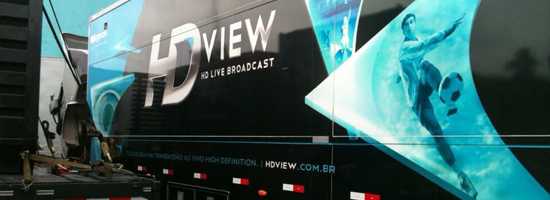
Comparing this to an event like the NBA Global Games, which is a friendly match, is pretty different. On Friday, we got a script with all commercial breaks, and special clips coming from EVS, all sponsored of course. We played the sponsor videos out from EVS and not from the video mixer, which is normal in the US. This may be done this way because the director is also switching himself. So, there is no technical director (TD) to do that for him. Then we had some rehearsals, meetings, and checks until the end of the afternoon.
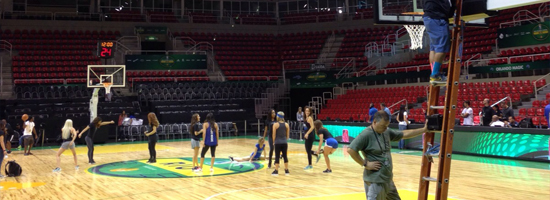 \
\
On the match day we had the last rehearsals and meetings about changes in the format and we got ready for the match. Basketball in the U.S. You can’t compare it to basketball anywhere else in the world. I’ve worked on several American productions and always some things surprised me, the attention to detail, the size of the production, how much money there is involved in American entertainment and that people are paying the amounts of money to watch matches. That’s just incredible! I watch it jealously and wished Brazil would have this same sports climate, because the culture they already have.
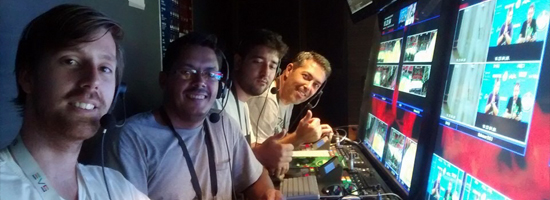
THE game Orlando Magic vs Flamengo:
Roeland van der Manden
More info you can find on his LinkedIn: www.linkedin.com/pub/roeland-van-der-manden , Check his website or follow him on Twitter AmsterdamProductions
mentioned:
EVS: website - facebook - twitter
NBA Global Games: website - facebook - twitter - youtube
Guest Columnist Roeland van der Manden
Guest Columnist Roeland van der Manden
The third guest columnist for BroadcastBrazil

Introduction:
Roeland van der Manden is a Dutch EVS-operator living in Rio de Janeiro, Brazil.
Roeland started working in the television business in 2008 for Eyeworks sports as an EVS-operator, responsible for live replays, live highlight edits, rollouts and other play outs. Later, that year productions of the national Dutch league went to Endemol sports. After working a year for Endemol sports Roeland moved to Rio de Janeiro, Brazil. Finding a hard time entering the local market in Rio, he got some propositions to work in Saudi-Arabia on the Saudi soccer league.
The first Brazilian job Roeland got himself into was the Ultimate Fighting Championship (UFC) in Brazil. The first contact in Brazil was Daniel Littwin, founder of New York Digital, a São Paulo based production company. That was the first step of the start of his career in Brazil. Throughout that event Roeland got to know many people and “that’s the way it works in Brazil”. In 2014, Roeland worked on the FIFA 2014 World Cup Brasil for Univision USA and later that year he founded his own production company “Amsterdam productions” where he produces videos for the Dutch Consulate in Rio de Janeiro and LS Concursos among others.
Roeland still works on the UFC events in Brazil, as well as on the Brazilian national soccer league, Rio Open tennis, Basketball matches (National and NBA Global Games) and will be working on the 2016 Olympic Games Rio.
We need more Guest Columnists at Broadcast Brazil, if you want to share your thoughts, join us.
Roeland van der Manden
More info you can find on his LinkedIn: www.linkedin.com/pub/roeland-van-der-manden , Check his website or follow him on Twitter AmsterdamProductions